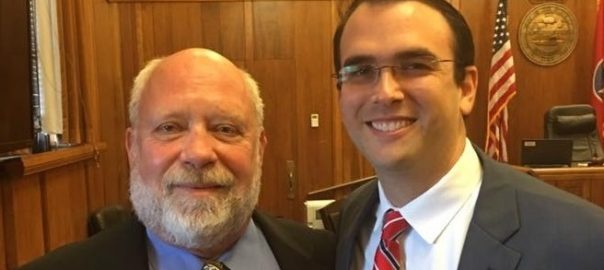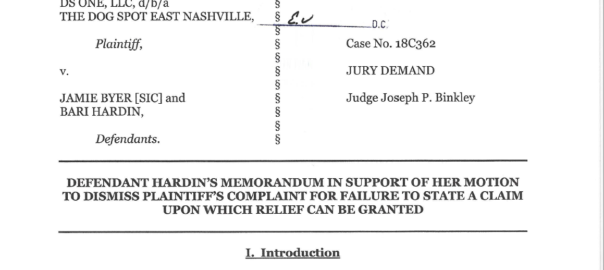By Daniel Horwitz:
It seems that almost every week now, government officials involved in Tennessee’s justice system make headlines for their overt, unapologetic bigotry. In May of this year, for instance, Shelby County Criminal Court Judge Jim Lammey gained national attention after posting an article that referred to Muslim immigrants as “foreign mud” and said that Jews should “get the f**k over the Holocaust.” Weeks later, Coffee County District Attorney Craig Northcutt provoked an initial wave of outrage after posting (among other disqualifying nonsense) that Muslims’ “belief system is evil, violent and against God’s Truth,” only to outdo himself shortly thereafter when a video surfaced of him proclaiming that gay couples don’t enjoy constitutional rights and would not be protected by domestic violence statutes within his jurisdiction. And today, the Knoxville News Sentinel reports that Knox County Sheriff’s Detective Grayson Fritts recently declared that “federal, state and county governments should arrest, try, convict and ‘speedily’ execute people within the LGBTQ community” for participating in Pride parades.
These outrages are not isolated. They also are not surprising, given the shockingly indifferent way that such disqualifying conduct is treated by the bureaucrats who oversee Tennessee’s justice system. And they will continue to occur over and over and over again until administrators like BPR Chief Disciplinary Counsel Sandy Garrett are replaced with competent, capable people who consider bigotry and misconduct by public officials at least as problematic as private attorneys loaning poor clients money so that they can pay their rent.
This is not an exaggeration. Tennessee’s Board of Professional Responsibility—the shadowy, quasi-governmental body that regulates lawyers in Tennessee—has routinely turned a blind eye to racism and approached the absolute worst forms of misconduct with kid gloves under circumstances when the violators were participants in Tennessee’s justice system. In 2014, for instance, a Shelby County District Attorney who was caught (and admitted) withholding exonerating evidence in a capital murder case received nothing more than a public censure. In other circumstances, misconduct in the form of racist comments made by District Attorneys during prosecutions were ignored by the body entirely. And indeed, during an insane attempted power grab last year that would have afforded the BPR wide-ranging authority to censor and prosecute a vast amount of constitutionally protected, private attorney speech, at Ms. Garrett’s urging, the BPR itself sought to carve out a special disciplinary exemption for prosecutors who exercised racist peremptory challenges during jury selection.
By contrast, trivial violations that most reasonable people would not consider misconduct at all are met with fire and fury. For instance, in only the latest indication that Tennessee’s BPR has lost both its purpose and its mind, the Board came down hard on one lawyer for what is apparently considered an egregious offense in this State: Helping a poor client pay her rent. Ultimately, the punishment he received was identical to the sanction that the BPR levied against the above-mentioned Memphis prosecutor who hid exonerating evidence in a capital murder case—a fact that says just about everything that needs to be said about the BPR, its judgment, and its priorities.
Most troublingly, though, Garrett’s BPR has helped prevent serious misconduct by public officials from coming to light by aggressively prosecuting attorneys across the state for having the audacity to speak up or speak out against judges. Indeed, notwithstanding the absence of any conceivable harm to the public, there appears to be no surer way to guarantee severe professional sanction in Tennessee—including summary, indefinite suspension—than to stand up to a judge. Given this context, it is fair to wonder whether the culture of silence and censorship that Garrett’s BPR fosters—whether deliberately or otherwise—serves to inhibit whistleblowing and allows misconduct by public officials to fester unchecked for years. Indeed, one wonders whether that’s the point.
Year after year, bar associations and self-important bar leaders across Tennessee wonder aloud why the legal profession is consistently held in such low esteem by the general public. Curiously, the existence of bigoted judges and prosecutors, a structurally inadequate indigent defense system, and highly questionable behavior by professional regulators—both with respect to the way they treat practicing attorneys and prospective lawyers—never seem to come up as possible explanations. Certainly, the solutions sought by the BPR don’t address any of the many legitimate reasons why the public would hold the entire legal system in low regard. Instead, to the exclusion of any justifiable priority, the approach of Tennessee’s BPR has largely been to censor and prosecute lawyers who criticize governmental participants in a legal system that is failing daily.
Though few dare to challenge the BPR’s behavior and priorities given credible fear of retaliation, it is past time that the BPR secured new leadership. As Garrett’s BPR demonstrates year after year, the body quite simply lacks the judgment to oversee or regulate the practice of law in Tennessee. Having failed to do her job competently for long enough, the Tennessee Supreme Court should replace her. Alternatively, for the good of the profession, Garrett should do the honorable thing and resign.
Like ScotBlog? Join our email list or contact us here, or follow along on Twitter @Scot_Blog and facebook at https://www.facebook.com/scotblog.org





